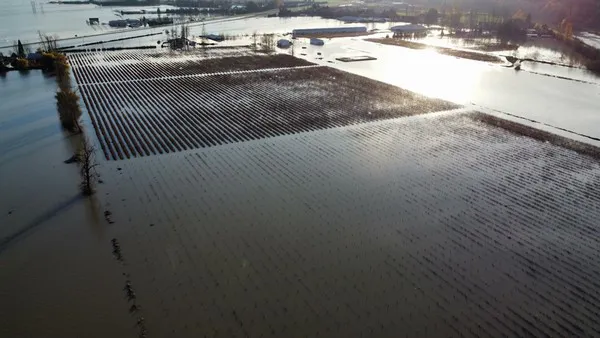From flooded fields and homes to supply chain issues, this is an especially challenging time for British Columbia. We stand with the those impacted by floods.
Our hearts go out to the growers whose homes are flooded. Their loss is insurmountable. Blueberry grower Jaswant Dhillon says his “family has lost everything, including precious family memories. The entire house is unsalvageable.”
In this unprecedented event of great magnitude, at least 2,500 acres of blueberries have been impacted and of these, approximately 1000 acres still remain under water, specifically in the Sumas Prairie area. The total acreage of blueberry production in B.C. is approximately 27,000 acres reports Statistics Canada.
 An impacted blueberry field in the Sumas Prairie area. Image submitted by a B.C. Blueberry grower.
An impacted blueberry field in the Sumas Prairie area. Image submitted by a B.C. Blueberry grower.
Some portions of the Matsqui Flats area were also completely submerged for a period of time, and other areas near the Fraser River remain flooded to a lesser extent. Growers in less flooded areas where the water drained after five to six days and was 2-3’ deep will possibly have a chance to recover their fields.
In the Sumas Prairie region, some growers report there is up to seven to eight feet of water in fields and are concerned about the long-term impact, especially due to debris and other possible issues arising from plants being submerged for an extended period.
“There is a strong possibility that severely impacted growers will need to pull out their plants and replant them, which could be a large financial expense,” says Harry Sidhu, whose family farms in Sumas Prairie. “Blueberries are a perennial plant and it takes years for a sizeable crop yield, so this may be a significant loss of income for many years."
This is still an active and evolving situation. Currently, the Council is identifying severely impacted growers and finding ways to assist them.
“Damage to fields will need to be reassessed once the water recedes,” says Jason Smith, BC Blueberry Council Chair. Smith also says the vast majority of the growing region is not impacted and there is no short or long-term impact for consumers of blueberries.
The last few years have been challenging for the BC blueberry industry, due to unpredictable weather events and pollination challenges which led to less-than-optimal volumes in production. In 2019, the crop volume was around 200 million pounds. It dropped by approximately 20 million pounds in 2020 and by nearly 50 million pounds in 2021.
To overcome some of these challenges, impacted blueberry growers need assistance. The blueberry industry is a defining characteristic of British Columbia, and the livelihood of many families, thus the BC Blueberry Council is asking for its flood impacted members to be fully included in all government relief measures.
The Council has created a resource page outlining available assistance.
For more information: Clara Moran-Sakalauskas
Clara Moran-Sakalauskas
Brooklynn Doucette
B.C. Blueberry Council
Tel: +1 (604) 864 2117
[email protected]
[email protected]
https://gobluebc.ca/
https://www.bcblueberry.com/
